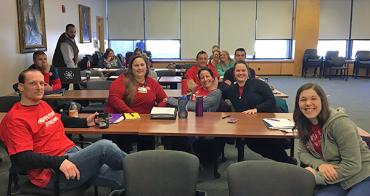The technical professionals at the University of Vermont Medical Center in Burlington who are represented by the Vermont Federation of Nurses and Health Professionals ratified a new three-year agreement with the hospital on March 7. Patient care was the biggest focus in the contract campaign for the techs, but they came away with another huge win: unprecedented member engagement.
Lead negotiator Chris Gonyeau, a respiratory therapist, says the enthusiasm of his colleagues was reminiscent of when the techs organized in 2009. “I was there when we first formed our union; there was a lot of involvement then, and our campaign reminded me of that.”
The techs’ fight for a contract comes on the heels of the center’s nurses who waged a seven-month fight and subsequent strike for a fair contract last year. Gonyeau believes the momentum from that fight spilled into the techs’ campaign. “We supported the nurses, and our members were motivated by what they did to improve patient care.”
The bargaining sessions began in December and were well attended, says Gonyeau. “People were fully engaged and knew what was happening with negotiations. We easily had a couple of hundred members show up to the meetings,” he adds, noting that good communication with members was a key to the campaign’s success.
Nicole DiVita, an ophthalmic technician, who has worked at the hospital for nearly three years, agrees. “Our communication kept everyone united.” DiVita volunteered to be on the bargaining committee, making her a first-time activist. Taking part in bargaining gave DiVita a sense of camaraderie with her colleagues, she says. It also gave her an opportunity to focus on her concerns, including the quest for a livable wage.
The new contract covers 340 technical professionals in more than a dozen job classifications, including EMTs, paramedics, hemodialysis technicians and professional coders. Members won significant economic gains, which will bolster recruitment and retention of technical professionals.
Better wages will make people see these jobs as careers, says DiVita. Short staffing is a problem for techs, and the pay differentials in the contract address that as well. “So many of us end up staying when our shift is over; the end-of-shift differential will make a difference,” she adds.
The techs fought off an “unrealistic” mandatory float proposal from management that would have affected EMTs, paramedics and dialysis techs while achieving language that gives them parity with nurses when it comes to urgent pay for call-in and on-call workers.
“This contract campaign reinvigorated the technical group,” says Gonyeau, “and improved our ability to fight for patient care and staffing.”
The contract campaign has positioned the techs to build on their success and keep members involved. Gonyeau says the increased communication allowed some techs to fix issues they didn’t know were covered in the contract.
“This whole process made me aware of how much we all have to fight to keep our facility safe for everyone,” says DiVita. “It was an eye-opening experience, and made me passionate about making our environment safe and giving great quality care.” That’s why DiVita has volunteered once again; this time, she is going to be a chief steward.
[Adrienne Coles]

